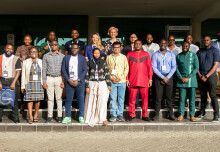

Scientists to investigate the causes and levels climate change on Earth - <em>News Release</em>
For immediate release
5 October 2005
The creation of a new multi-million pound research centre to tackle climate change is announced by Imperial College London today. The cross-disciplinary centre will lead major new research programmes looking into the causes and levels of climate change from different scientific perspectives. Research will also focus on tackling the major impact climate change will have on the planet, from rising sea levels and decreasing biodiversity, to the spread of tropical diseases like malaria in previously temperate climates.
The establishment of the new Centre for Climate Change Research was marked today with the launch of a major international recruitment campaign to find a Director and a Chair for the Centre. In the coming months a further professor, three readers, five lecturers and two RCUK fellowships will also be recruited to create a substantial team of leading scientists from numerous disciplines.
The new Centre is being developed to draw on the existing expertise of Imperial's world-leading academics across the entire spectrum of climate change research, including atmospheric physics, atmospheric chemistry, modelling, hydrology, oceanography, paeleoclimatology, population biology and environmental policy.
Professor Sir Peter Knight FRS , Principal of Imperial's Faculty of Natural Sciences, who led the drive for the new centre, said: "Handling climate change is the biggest challenge that has ever faced modern science. From adapting farming practices in changing climates, to protecting threatened wildlife and safeguarding human health, the changing climate of our planet will have an immense effect on life on Earth."
A key focus for the new centre will be minimising the current uncertainty in scientific predictions over how much the climate is changing and what the impact will be. This more exact information will make it easier for governments, industry and individuals to plan for issues such as rising sea levels and changing weather patterns.
Sir Peter added: "This is literally a matter of life and death for future generations and that's why we are putting in place the research infrastructure at Imperial for scientists to tackle these problems."
-Ends-
For more information please contact:
Danielle Reeves, Imperial College London press office
Tel: +44 (0)20 7594 2198
Mobile: +44 (0)7803 886248
Email: danielle.reeves@imperial.ac.uk
Notes to Editors:
1. For further details of the Centre for Climate Change Research go to www.imperial.ac.uk/climatechange
2. Consistently rated in the top three UK university institutions, Imperial College London is a world leading science-based university whose reputation for excellence in teaching and research attracts students (11,500) and staff (6,000) of the highest international quality. Innovative research at the College explores the interface between science, medicine, engineering and management and delivers practical solutions that enhance the quality of life and the environment - underpinned by a dynamic enterprise culture.
Website: www.imperial.ac.uk
Article text (excluding photos or graphics) available under an Attribution-NonCommercial-ShareAlike Creative Commons license.
Photos and graphics subject to third party copyright used with permission or © Imperial College London.





